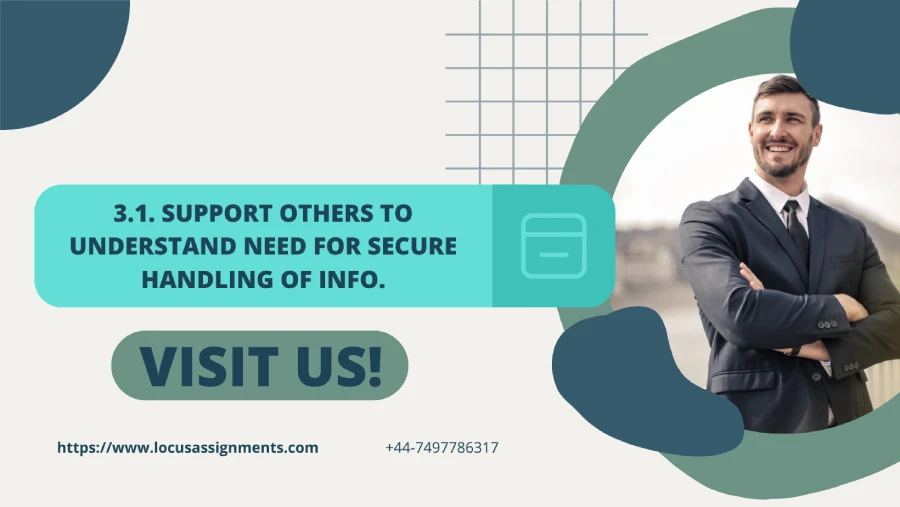3.1. Support others to understand need for secure handling of info.

3.1. Support others to understand the need for secure handling of information
Course-Level 3 diploma in care (RQF)
Unit 9 – Promote Effective Handling of Information in Care Settings
L.O 3 – Be able to support others to handle information
It is essential that in care settings, staff support others to understand the importance of securely handling information to support service users, uphold standards of professionalism, and remain within the law. In supporting secure handling, it is also an important consideration to provide an environment which supports secure information handling. This culture and environment inform staff understanding of their role in supporting confidentiality and the value of working in organisations that promote safe practices. Secure handling of information is not only about the processes but also less tangible practice. It is important to embed a culture that values confidentiality and an environment where all staff have an understanding of their role in ensuring safe handling of information.
Why Information Security is Important
A care worker will carry highly sensitive and financial information that it is critical to handle securely. Securely handling information is important because:
Legal Compliance: There are laws such as the Data Protection Act 2018 and GDPR, which contain legally mandated standards for confidentiality. Staff can find themselves and the organisation penalised for breaches.
Protection of your client/service user: Mishandling information can result in breaches of privacy, identity theft or emotional harm to the user, which ultimately erodes trust in caring services.
Professional reputation and credibility: Confidentiality helps build and maintain public trust in care organisations. It makes sure care organisations are compliant with regulators' desired expectations.
Supporting Others Effectively
Staff support can be achieved in many ways:
Training/training and guidance: Offering induction training and refresher training on policies and procedures, record keeping and digital safety.
Clear communication: Providing policy and procedural material that staff can easily access and providing explanations of systems (manual and electronic) in a simplified way.
Role modelling: Role modelling behaviour (locking computer screens, storing files securely).Accountability: Allowing staff to take ownership of their practices and providing constructive feedback if they make errors.
Technology: Promoting safe systems like encrypted or other secure software and recommending regularly updated antivirus/antimalware software.
Explaining Risks and Rewards
It is important to explain both sides. The risks of poor practice can include data breaches, disciplinary action and complaints, whereas the rewards of secure handling of information can include compliance with the law, safer care and trust between staff, service users and families.
Ongoing Support
This is not a once-only event – providing ongoing supervision and feedback and creating an open culture where questions are acceptable can help to maintain high standards. Recognising and praising good practice reinforces good behaviours.
If care workers are able to apply these strategies, then they are more likely to understand why it does matter in the safe handling of information and feel reassured that they are taking reasonable care of their responsibilities. They are also helping protect the rights of individuals and help to support the safe and effective running of care services.
Handling information securely is a key responsibility in care. If you find it challenging to express these concepts in your coursework, our assignment help at Locus Assignments ensures you get structured, well-researched, and professionally written answers for your assignments.
Assignment help ?
Get Expert Assignment help today!
Fast • Reliable • Expert Support
Upload NowOther Assignments